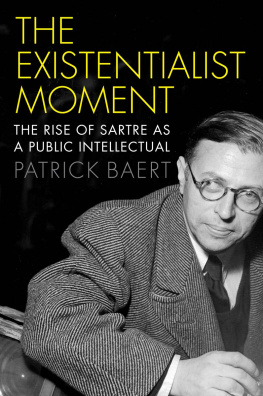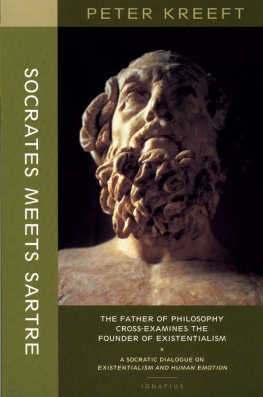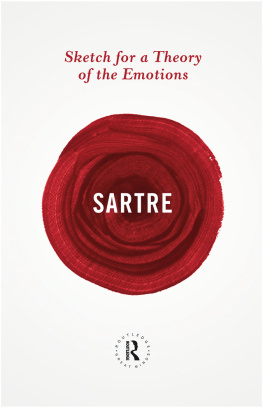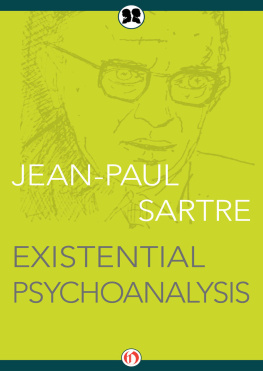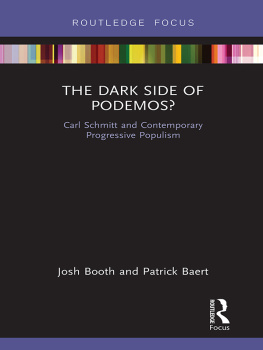Baert - The Existentialist Moment The Rise of Sartre as a Public Intellectual
Here you can read online Baert - The Existentialist Moment The Rise of Sartre as a Public Intellectual full text of the book (entire story) in english for free. Download pdf and epub, get meaning, cover and reviews about this ebook. year: 2015, publisher: Wiley, genre: Politics. Description of the work, (preface) as well as reviews are available. Best literature library LitArk.com created for fans of good reading and offers a wide selection of genres:
Romance novel
Science fiction
Adventure
Detective
Science
History
Home and family
Prose
Art
Politics
Computer
Non-fiction
Religion
Business
Children
Humor
Choose a favorite category and find really read worthwhile books. Enjoy immersion in the world of imagination, feel the emotions of the characters or learn something new for yourself, make an fascinating discovery.
The Existentialist Moment The Rise of Sartre as a Public Intellectual: summary, description and annotation
We offer to read an annotation, description, summary or preface (depends on what the author of the book "The Existentialist Moment The Rise of Sartre as a Public Intellectual" wrote himself). If you haven't found the necessary information about the book — write in the comments, we will try to find it.
Baert: author's other books
Who wrote The Existentialist Moment The Rise of Sartre as a Public Intellectual? Find out the surname, the name of the author of the book and a list of all author's works by series.
The Existentialist Moment The Rise of Sartre as a Public Intellectual — read online for free the complete book (whole text) full work
Below is the text of the book, divided by pages. System saving the place of the last page read, allows you to conveniently read the book "The Existentialist Moment The Rise of Sartre as a Public Intellectual" online for free, without having to search again every time where you left off. Put a bookmark, and you can go to the page where you finished reading at any time.
Font size:
Interval:
Bookmark:

Patrick Baert
polity
Copyright Patrick Baert 2015
The right of Patrick Baert to be identified as Author of this Work has been asserted in accordance with the UK Copyright, Designs and Patents Act 1988.
First published in 2015 by Polity Press
Polity Press
65 Bridge Street
Cambridge CB2 1UR, UK
Polity Press
350 Main Street
Malden, MA 02148, USA
All rights reserved. Except for the quotation of short passages for the purpose of criticism and review, no part of this publication may be reproduced, stored in a retrieval system, or transmitted, in any form or by any means, electronic, mechanical, photocopying, recording or otherwise, without the prior permission of the publisher.
ISBN-13: 978-0-7456-8543-4
A catalogue record for this book is available from the British Library.
Library of Congress Cataloging-in-Publication Data
Baert, Patrick, 1961
The existentialist moment : the rise of Sartre as a public intellectual / Patrick Baert.
pages cm
Includes bibliographical references and index.
ISBN 978-0-7456-8539-7 (hardcover : alk. paper) -- ISBN 0-7456-8539-0 (hardcover : alk. paper) -- ISBN 978-0-7456-8540-3 (pbk. : alk. paper) -- ISBN 0-7456-8540-4 (pbk. : alk. paper) 1. Sartre, Jean-Paul, 1905-1980. 2. Existentialism. I. Title.
B2430.S34B255 2015
194--dc23
2014043776
The publisher has used its best endeavours to ensure that the URLs for external websites referred to in this book are correct and active at the time of going to press. However, the publisher has no responsibility for the websites and can make no guarantee that a site will remain live or that the content is or will remain appropriate.
Every effort has been made to trace all copyright holders, but if any have been inadvertently overlooked the publisher will be pleased to include any necessary credits in any subsequent reprint or edition.
For further information on Polity, visit our website: politybooks.com
I would like to thank Elliott Karstadt, India Darsley and Susan Beer at Polity Press for their help and patience with this project. I am also grateful to John Thompson, who has been encouraging throughout and provided important input at crucial points. I wish to thank Bruno Frre, Marcus Morgan and Flore Cuny for reading the whole manuscript carefully and for suggesting significant improvements. I would like to thank various people who have commented substantially on sections of the book, or on my conference presentations related to the book: in particular, Jeffrey Alexander, Ed Baring, Damian Catani, Randall Collins, Emma Murray, Gisle Sapiro, Alan Shipman and Darin Weinberg. The comments by anonymous reviewers have been extremely helpful, for which I am most grateful.
Some of the research and writing took place while I visited the Sociology Departments of Brown University and the University of Cape Town, as well as the Centre europen de sociologie et de science politique (CNRS-EHESS-Universit de Paris I Panthon Sorbonne). I am also thankful to staff at the British Library, the University Library in Cambridge and the Bibliothque nationale de France.
The research leading to these results has received funding from the European Union Seventh Framework Programme (FP7/2007-2013) under Grant Agreement no. 319974 (INTERCO-SSH). This book also benefited from a Leverhulme fellowship (RF-2012-339) and a British Academy small grant (SG102163).
Jean-Paul Sartre achieved an astonishingly high public profile during his heyday. Commentators invariably refer to the huge crowds at his funeral (50,000 according to one estimate), but the evidence for his public standing in France (and indeed abroad) goes well beyond this single event. Sartres books and plays have been a remarkable success, and once he had come to public prominence he managed to draw large audiences whenever he gave lectures. The amount of sustained media attention and his political influence in France and abroad has been unrivalled.
This book is an attempt to comprehend this extraordinary case of public celebrity. We will not be discussing at length all of Sartres forays into politics which stretched over a period of nearly four decades; there are many books that have documented this aspect of his biography extremely well. Instead, we will try to focus on the period, in France, when Sartre rose from relative obscurity to public prominence. We call it the existentialist moment because we are talking about a short time span, one in which not just Sartre, but also his philosophy, caught the publics imagination.
Popular conceptions of Sartre tend to locate his rise and that of existentialism in the context of the political turmoil of the 1960s and the student movement, but closer scrutiny shows that this was a period when Sartres philosophical status and, to some extent, his public impact was already on the wane. Sartre came to public prominence much earlier, in the mid-1940s. His popularity and that of his philosophy rose dramatically in a remarkably short space of time, between 1944 and 1947 especially in the autumn of 1945. This is not to say that there was no interest in his writings before 1944, Yet, within a mere two to three years, Sartre would turn into a major public figure and existentialism would become vogue. After 1947 Sartre and his fellow existentialists managed to maintain a high profile, though there was no longer a significant rise in their popularity and their philosophy played increasingly less of a role. Indeed, from the late 1940s onwards, the political issues of the day, rather than philosophy, underscored the public appearances and writings of Sartre, de Beauvoir and Camus, as they, like most other intellectuals in France, became embroiled in the cold war over which they eventually fell out.
The central question, therefore, is twofold: one aspect deals with timing, the other with Sartres philosophy itself. Firstly, why did Sartre and his philosophical movement gain such rapid intellectual acceptance with an artistic and popular following in France at this particular time between 1944 and 1947, not before or after? Secondly, why during this period was it Sartres existentialist movement that was so successful in gaining popularity? After all, Sartres philosophical writings were rather opaque and the philosophical current of existentialism had a remarkably small following in France before 1944. Further, the philosophical origins of Sartres existentialism were distinctly German and were indebted to the work of Martin Heidegger, who had been tainted by his closeness to the Nazi regime during the 1930s.
To make sense of the rapid rise of Sartre in the mid-1940s in France, we will analyse various aspects of the socio-political climate at the time, two of which are worth flagging up here. Firstly, between 1940 and 1945, French intellectuals became involved in intense power struggles in which those seen to be associated with the Resistance were ultimately victorious. In this context, we study the activities of the Comit national des crivains, the Resistance organization of writers, as well as the purge (puration) of collaborationist intellectuals. We explore how some of the themes that were raised at the trials of collaborationist intellectuals, such as the notion of the authors responsibility, fed into Sartres existentialist concerns. Secondly, we analyse the role of Sartre in the repairing of severed social ties and the remaking of French nationhood. We argue that the notion of cultural trauma is particularly apt to describe the state of France at the time. Cultural trauma refers to a widespread sense that certain events in this case, Vichy and the occupation caused collective distress and irredeemable damage, potentially threatening the social fabric of society. Sartre expressed a sense of cultural trauma without using those words but also, crucially, provided a vocabulary to come to terms with it. We argue that it is this dual role that was a key to their success.
Next pageFont size:
Interval:
Bookmark:
Similar books «The Existentialist Moment The Rise of Sartre as a Public Intellectual»
Look at similar books to The Existentialist Moment The Rise of Sartre as a Public Intellectual. We have selected literature similar in name and meaning in the hope of providing readers with more options to find new, interesting, not yet read works.
Discussion, reviews of the book The Existentialist Moment The Rise of Sartre as a Public Intellectual and just readers' own opinions. Leave your comments, write what you think about the work, its meaning or the main characters. Specify what exactly you liked and what you didn't like, and why you think so.

